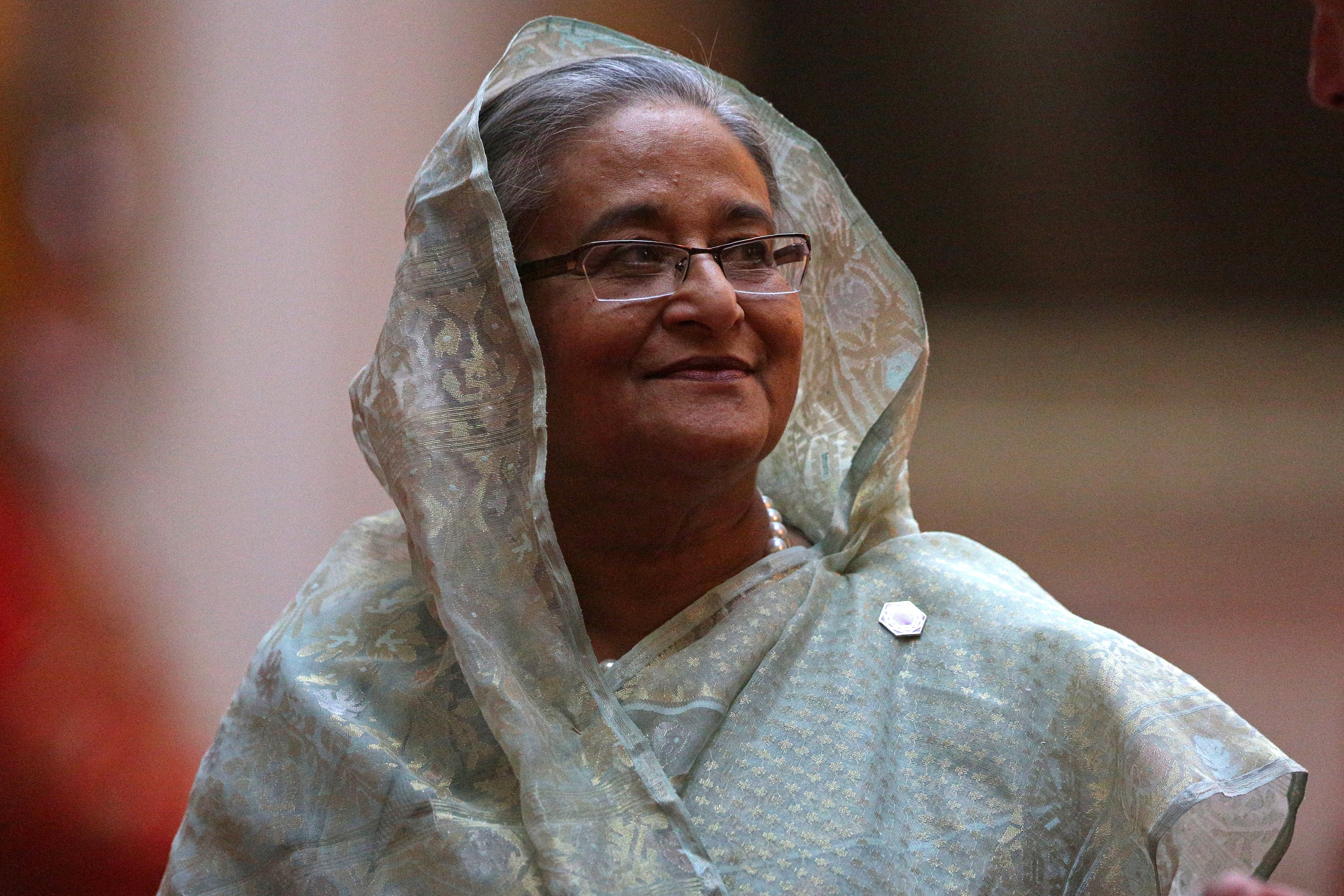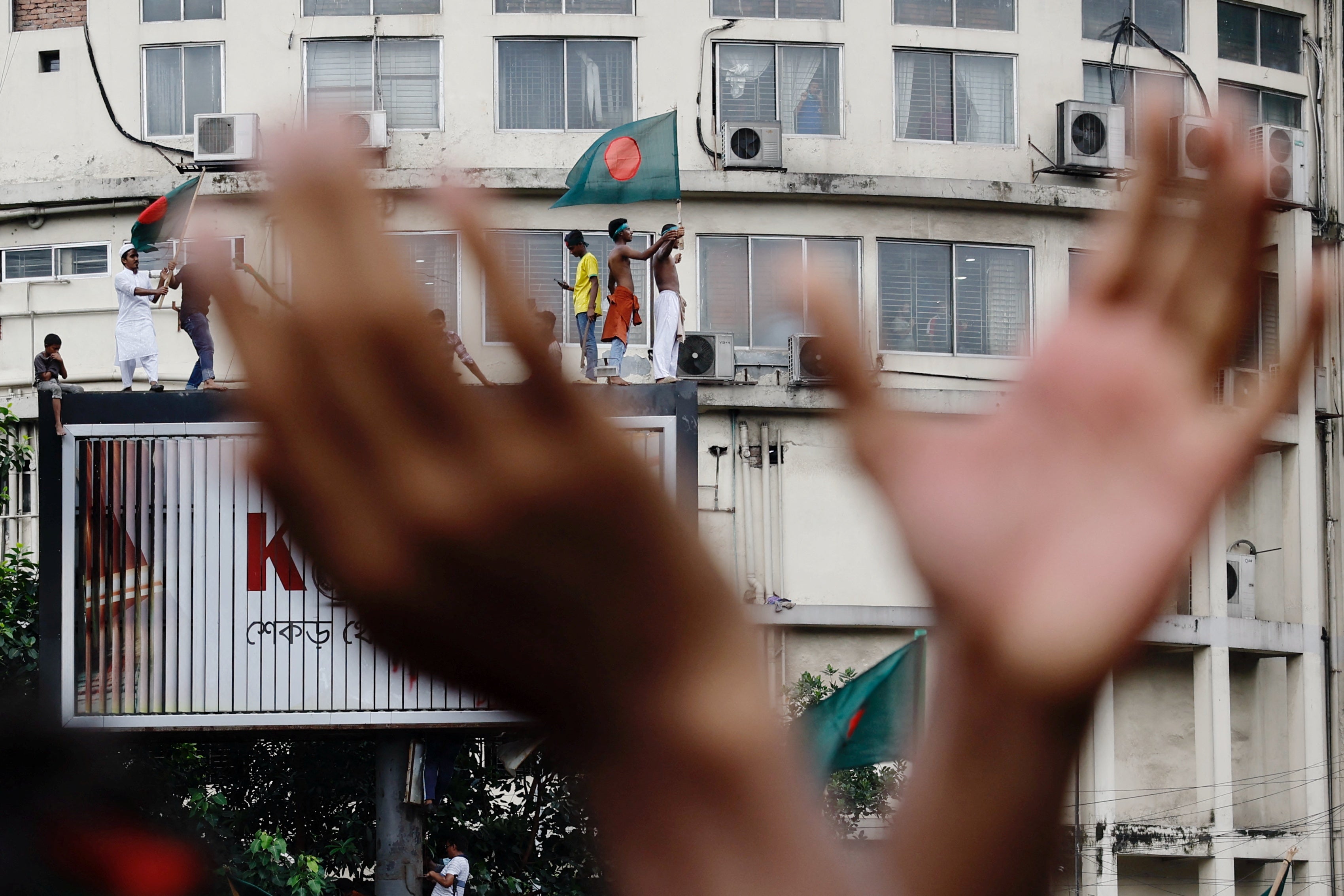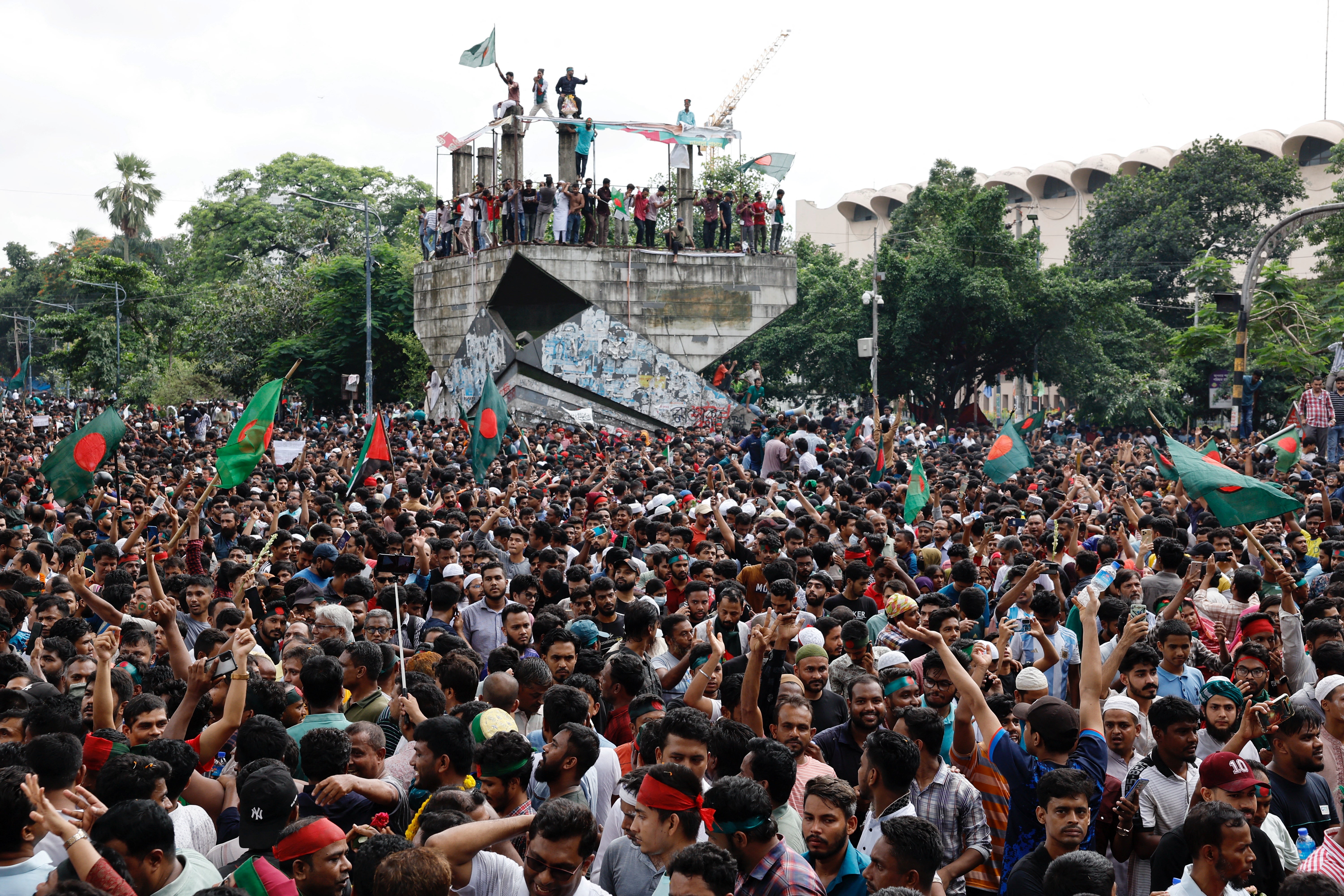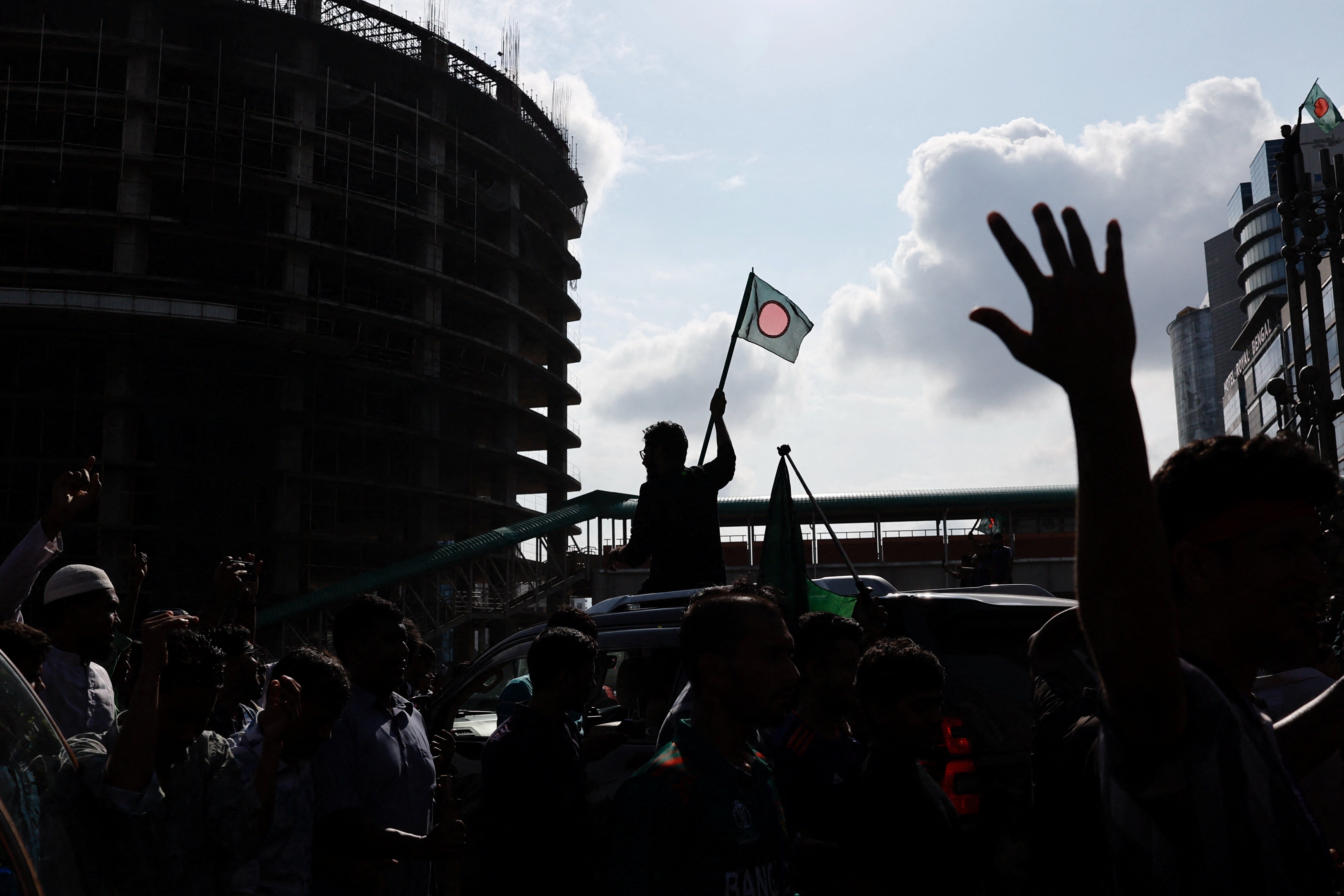Bangladesh PM Sheikh Hasina resigns and flees country after weeks of deadly protests
Thousands of protesters storm PM’s residence as she flees the country

Bangladesh’s prime minister Sheikh Hasina has resigned from her post and fled the country after weeks of violent clashes between police and protesters left nearly 300 people dead.
Ms Hasina left the capital Dhaka at 2.30pm local time on Monday on a military aircraft, reported newspaper Prothom Alo. It said the prime minister and her sister were heading to a “safer place”.
The flight into exile ended a 15-year second stint in power for Hasina, who has ruled for 20 of the last 30 years as leader of the political movement inherited from her father. He was assassinated with most of his family in a 1975 coup.
There was no immediate public statement from Ms Hasina’s office, but army chief Waker-Uz-Zaman said in an address to the nation that the prime minister had resigned and the army was in talks to form an interim government.
He said he had held talks with leaders of major political parties – excluding Hasina’s long-ruling Awami League – and would soon meet President Mohammed Shahabuddin to discuss the way ahead. “The country is going through a revolutionary period,” said General Zaman, who took over as army chief in June.
“I request you all to be a little patient, give us some time and together we will be able to solve all the problems,” Zaman added. “Please don’t go back to the path of violence and please return to non-violent and peaceful ways.”
Thousands of student protesters, who have been demonstrating against the Hasina government for weeks, rushed into the prime minister’s official residence in Dhaka on Monday after she fled, defying a curfew. Footage aired by local TV channels showed apparent looting and vandalism at the Ganabhaban residence, with protesters seen leaving carrying chairs and what appeared to be a sofa.
Some people were seen climbing a large statue of independence leader Sheikh Mujibur Rahman, Ms Hasina’s father, and chipping away at the head with an axe.
A gripped public watched to see where Ms Hasina would seek refuge. India’s ANI news agency claimed Ms Hasina, 76, landed at a military airfield near Delhi. A commercial tracking service showed a Bangladesh air force plane leaving the country and flying west before it disappeared.
Maryam Aontika, one of the protesters in Dhaka, told The Independent that the streets are now flooded with people from all walks of life celebrating “independence from tyranny”.
“It looks like the entire nation is on the streets and everyone – the old, the young, the children – are celebrating. We are celebrating independence from 15 years of dictatorship and tyranny. We are hopeful that an honest leader will take over,” she said over the phone from Dhaka.

The situation remained tense with the deployment of security forces to respond to the protests, although General Zaman said he had ordered police and the army not to fire on any protesters. Sunday’s clashes between protesters and police left more than 100 dead in total, including members of the security services.
Swift action should be taken to “ensure democracy prevails” in Bangladesh, Downing Street has said.
The British prime minister’s official spokesman said Sir Keir Starmer is “deeply saddened by the violence we’ve seen in Bangladesh in recent weeks”.
He added: “It's obviously escalated in recent days. A very significant loss of life, including of students, children and law enforcement officers is completely unacceptable.
“The right to peaceful protest must be protected and never subjected to violence, and we call on the authorities to release all peaceful protesters and ensure due process is followed for those charged and prosecuted.
“I hope that swift action is taken to ensure that democracy prevails and accelerate the process towards peace and security to people in Bangladesh.”
Bangladesh, the fourth largest country in the world by population, has been on edge for weeks amid unprecedented protests that began over a controversial quota system for government jobs. The system guaranteed a set proportion of roles to the descendants of fighters in Bangladesh’s war of independence – seen as a measure to appease Ms Hasina’s political base.
The protests were paused briefly after the Supreme Court scaled back the quota system, but by that point almost 200 had already been killed in clashes with the security forces, who were ordered to shoot protesters on sight. Demonstrators returned to the streets demanding an apology and Ms Hasina’s resignation.

On Monday, at least six people were killed in clashes between police and protesters in the Jatrabari and Dhaka Medical College areas, local media reported.
Sunday's death toll, which included at least 13 policemen, was the highest for a single day from any protests in Bangladesh's recent history, surpassing the 67 deaths reported on 19 July when students took to the streets against the quotas.
General Zaman in his address promised that the military would launch an investigation into the crackdown. He also asked citizens for time to restore peace.
“Keep faith in the military, we will investigate all the killings and punish the responsible,” he said.
“I have ordered that no army or police will indulge in any kind of firing.
“Now, the students’ duty is to stay calm and help us,” he added.
Earlier protesters had called for a march on Dhaka in defiance of a nationwide curfew.
Tanbirul Miraj Ripon, a Bangladeshi journalist, told The Independent that protest leaders and coordinators will be unlikely to accept the next steps laid out by General Zaman, and would demand to be involved in the selection of an interim government.
“This marks the end of dictatorship in the country. But the people here want justice for the hundreds of deaths,” he said.

Internet and broadband services were suspended early on Monday but restored ahead of the general’s statement, which was delayed by more than an hour amid reports of 11th-hour talks between the army and Ms Hasina’s office.
The military had imposed an indefinite curfew ahead of Monday’s events, which remained in place despite the protesters descending upon the prime minister’s residence, and the government had also announced a public holiday from Monday to Wednesday. Courts were to be closed indefinitely.
Ms Hasina had secured a fourth term after an election in January. The vote was deeply flawed however, boycotted by all the country’s main opposition groups as they accused the government of a far-reaching and uncompromising crackdown on dissent.
Ms Hasina and her government had attempted to take a hard line on the protests too, only fuelling public anger further by declaring all of the protesters “terrorists”.
“Those who are protesting on the streets right now are not students, but terrorists who are out to destabilise the nation,” she said after a national security panel meeting.
Ms Hasina is the daughter of Sheikh Mujibur Rahman, the man who led Bangladesh to independence. Her rule had long been marred with allegations of arbitrary detentions of opposition leaders and activists, crackdowns on free speech, control of the media and suppression of dissenting voices.
Join our commenting forum
Join thought-provoking conversations, follow other Independent readers and see their replies
Comments
Bookmark popover
Removed from bookmarks